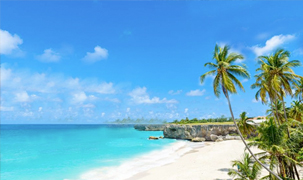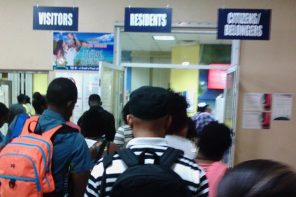Barbados is the latest popular holiday destination to introduce a tax on tourists, which could see families forced to pay more than £200 extra for a fortnight’s stay.
However, while many countries and resorts impose visitor levies to mitigate the environmental impact of mass tourism, the Caribbean island is doing so to raise money to reduce its overwhelming deficit.
The nation’s debt-ridden government gave hotels less than a week’s notice of the new surcharge, which came into force last weekend, with additional fees ranging from $2.50 (£1.90) to $10 (£7.60) per room per night, depending on accommodation class. The money will be collected in resort and is applicable to all existing bookings.
Tourism contributes to 40 per cent of Barbados’s GDP. (CREDIT: ISTOCK)
The new levy follows the introduction of an “airline travel and tourism development fee” of $70 (£53) to be imposed on travellers leaving the country from October 1, while VAT in the tourism sector will rise from 7.5 per cent to 15 per cent in 2020. Tourism contributes up to 40 per cent of Barbados’s GDP (13 per cent directly), the 14th highest percentage in the world.
The raft of taxes will hit hard the pockets of the 200,000 Britons who visit Barbados each year, but are seen as unavoidable by the island’s Prime Minister Mia Mottley, who is attempting to overturn a deficit worth 170 per cent of GDP. Motley, who came to power in a landslide victory in May, floated the taxes in her austerity budget earlier this month.
The 10 destinations most reliant on tourism
(by % of GDP)
- Maldives - 39.6%
- British Virgin Islands - 35.4%
- Macau - 29.3%
- Aruba - 28.1%
- Seychelles - 26.4%
- Curaçao - 23.4%
- Anguilla - 21.1%
- Bahamas - 19%
- Vanuatu - 18.2%
- Cape Verde - 17.8%
“It’s an outrage,” Amanda Matthews, managing director of Designer Travel, which runs luxury holidays to Barbados, told Travel Weekly. “I could understand it if it was on new bookings but we have clients who booked a year ago.
“We now have to tell them there is a tax. They are not happy.
“This is already a premium-priced island and this will make it so expensive.”
Sandals, however, said it would absorb the cost at its two resorts and is happy to contribute to the island’s economy.
“It is early days [but] we have made it clear that we are willing to participate in the new luxury tax on the hotel,” said Adam Stewart, deputy chairman of Sandals Resorts International.
“The Government is going to do what they have to do and certainly we want to continue to play our part.”
Sandals is poised to start work on a new resort on the island, with ground-breaking set for January next year. Stewart said the taxes have had no impact on the popular luxury resort’s plans.
Another luxury operator, Kuoni, said it will cover the cost for those currently in resort but has contacted customers booked to travel in the near future to inform them of the need to pay in resort. A spokesperson said the operator “fully understood the reasons for introducing the tax” and was supportive of investment in the destination.
“In a price sensitive market, anything that adds cost is a risk, but we need to work together so communications are clear and there are no surprises for customers when they check out of their hotel,” the spokesperson said.
“Barbados is our most popular Caribbean island — it’s well loved and has a loyal customer base — but it’s a competitive landscape so Barbados needs to do what it feels is right to develop its tourism infrastructure and industry.”
Virgin Holidays said, too, its customers would be responsible for paying the tax.
Britons visit Barbados for its “winning combination of the familiar and exotic, with Anglican churches and cricket greens in every village — yet also green monkeys sometimes appearing in your hotel garden,” writes Telegraph Travel’s Barbados expert Fred Mawer.
The country is also seen as safe, with holidaymakers able to venture outside the resort and explore, something seen as risky on other Caribbean islands. Its financial situation, however, has become a cause for concern.
Writing in March, The Telegraph’s Julia Bradshaw, who lived on the island, said Barbados “stinks” thanks to a lack of investment in the sewage system.
“This sewage problem is blighting the south coast of the island I used to call home, and is a symptom of the incompetence and perceived corruption of the current administration, which Barbadians have dubbed the ‘do-little government’,” she said.
“Already, a local school and post office have been forced to close, businesses and restaurants are suffering, and many Bajans and visitors have come down with violent bouts of gastroenteritis. This tragedy is a catastrophe for a country so dependent on tourism and a national humiliation for an island that was once a model of success in the Caribbean.”
More and more holiday destinations are introducing additional taxes on visitors, most in an effort to mitigate the impact of mass tourism and encourage a sustainable industry.
Last week, New Zealand became the latest, introducing a NZ$35 (£18) entry fee for each visitor. In a statement on the New Zealand government’s website, they state the purpose of the tourist tax is to ensure tourists “contribute to the infrastructure they use and help protect the natural environment they enjoy”.
A number of European countries charge fees to incoming visitors, including France, Italy and Spain. In May this year, the Balearic Islands doubled the tax that they charge tourists, meaning those staying in luxury accommodation now pay $4 (£3) per person per night while campers are charged $1 (75p).
Does it work? Speaking to Telegraph Travel, Tim Williamson of Responsible Travel said: “A tourist tax might be a possible solution to over-tourism and may help to reduce demand but better still if the money raised is ring-fenced and directly benefits the local community affected by over-tourism.




